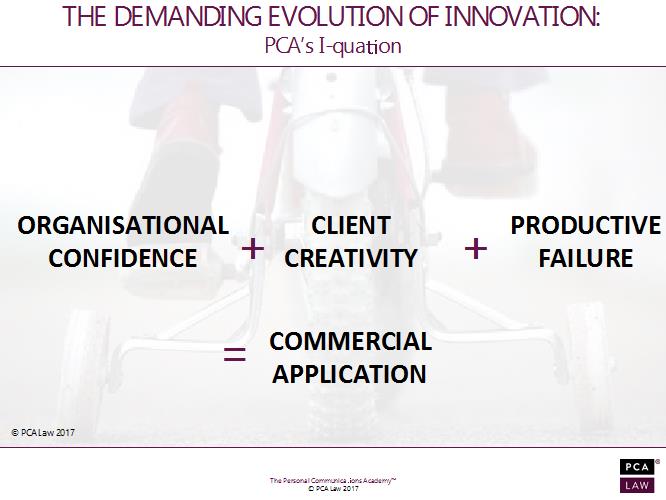If we are to believe the word on the street or at least the words in those glossy new brochures, the legal sector is awash with innovation. Overflowing with it. According to those funky rebranded websites, virtually every lawyer in the world is engaged in their own daily quest to be the legal sector’s answer to Steve Jobs. Silicon Valley, eat your heart out.
REALLY? IS INNOVATION RIFE IN THE LEGAL SECTOR?
Lawyers and change. Law firms and creativity. The legal sector and revolution. Not concepts that have traditionally sat side by side.
While many of us in the sector would agree there are a number of new, exciting and potentially disruptive ideas coming through, for example the rapid rise of technology and the gradual emergence of new firm structures, we struggle to reimagine the sector as a hot bed of innovators and change agents. For a start, everybody is just too busy to have any big ideas. Secondly, big ideas are usually non-billable. And thirdly, the word – innovation – is just plain scary.
Yes, our clients demand it. Yes, it genuinely helps us to stand out from the crowd. Our PR people can’t get enough of it. We’re constantly told it’s the future. Gen Y seem to be obsessed with it. It can transform our bottom line and, according to their websites, our competitors are bathing in it. So, it seems that unless we engage in it, we’re going to get left behind like a dinosaur. And we all know what happened to them.
FOUR KEY INGREDIENTS OF INNOVATION IN A LAW FIRM
But what exactly does innovation look like in a law firm? And how can we genuinely come through on all those lofty promises we’ve made on our websites?
At PCA, we’ve been lucky enough to work with some of the most innovative organisations inside and outside of the legal sector. We’ve been able to break innovation down into four key ingredients that we see day in, day out (see below graphic). When you look at the four components in isolation, you realise that innovation is much less radical than the word suggests and it’s actually about getting back to basics.
Boston Consulting Group’s annual list of the world’s 50 most innovative companies consistently features brand names that we would all immediately associate with being ahead of the curve – Apple, Google, Tesla, Microsoft and Samsung were the top five last year – but the list also contains organisations that are doing some of the simple things very well.

The first ingredient we’ve identified is something we call organisational confidence. This is to do with your own internal structures and processes. It’s about removing the fear of innovation by having the strength of a safety net within your organisation. It comes down to having the right people, in the right roles, performing at the right level. Having confidence they all know exactly what their role is; that they collaborate and communicate brilliantly as a team. It involves objective setting, delegation, feedback, project management, customer relationship management, financial hygiene, IT systems, excellent management skills and some good old-fashioned technical expertise. With these internal systems and skillsets in place, you have the foundation required for trying new things. You have organisational confidence.
This ingredient might feel like the most basic, however without organisational confidence there is no solid bedrock to evolve from.
Secondly, you need some client creativity. For lawyers, this is perhaps the most reassuring ingredient on the list. Interestingly, to be innovative, you don’t necessarily need to come up with any new ideas at all. All you need to do is find out what your clients’ ideas are. Let them be the blue-sky thinkers. Ask them the right questions; listen for, what they call in ethnographic terms, some “thick data” – the stuff that uncovers your clients’ emotions, stories and models of the world – and then take their ideas back to the safety of your organisationally confident offices.
You don’t even have to be the first people to try something. Apple weren’t the first to try the iPod; they were the first people to call it that. Nobody remembers the first people to try it (Google it). However, Apple were the first people to ask their market the right questions. They let their customers describe their dreams, listened properly to the thick data and then applied this information to their technological magic back at Apple HQ – in other words they utilised their organisational confidence.
Lawyers don’t need imagination and creativity. They have a ton of clients who have that in bucket loads (just look at the way your clients’ review your bills). Lawyers just need to utilise their questioning and listening skills to find out what their clients’ tomorrow looks like, today.
Innovation is about client service. It’s about product development. It’s about commercial growth. Ultimately, it’s about the bottom line
Thirdly, and this is the brave bit, lawyers and law firms need to engage in some productive failure. That’s right. Failure. Not the first word that partners aspire to achieve.
Our friends in Silicon Valley will tell you that in investment circles, if an entrepreneur hasn’t got a solid failure under their belt, they’re not yet to be trusted. Failure is worn as a badge of honour. Because, if you’re not willing to fail, how can you learn, grow and move on to the next level? How can you implement something that’s new if you don’t know how to react when it doesn’t go to plan?
It’s all very well having an innovation committee, but if there is a culture of fear, if people are scolded for not getting things right, rewarded for the same old, same old, and penalised for being brave and ahead of time, who in their right mind is going to be a champion of change? There needs to be more support, recognition and real incentives for those who want to try something different in law firms.
Finally, and perhaps most critically, there needs to be commercial application for something to be truly innovative. Having ideas and doing new things are not enough for innovation to succeed in the free market. Innovation is about finding a solution that answers people’s dreams or fears in a way that convinces them they need to pay for it.
This might sound obvious. Because it is. But it can be harnessed to help decision-makers in law firms realise innovation is not a nice-to-have, tick-box exercise. It’s not just a marketing buzzword because it looks pretty written in modern fonts on your firm website. It’s a set of processes and skills that every firm needs to develop. It’s about client service. It’s about product development. It’s about commercial growth. Ultimately, it’s about the bottom line.
That’s the reason why every law firm writes about innovation in their marketing materials. That’s the reason why every client asks you about it towards the end of your pitch.
The challenge is to make sure the reality of your answer lives up to the promise of your website. And for that, you don’t need to innovate – you need to go back to basics.
For more information please visit www.pcalaw.com

REALLY? IS INNOVATION RIFE IN THE LEGAL SECTOR?
FOUR KEY INGREDIENTS OF INNOVATION IN A LAW FIRM


